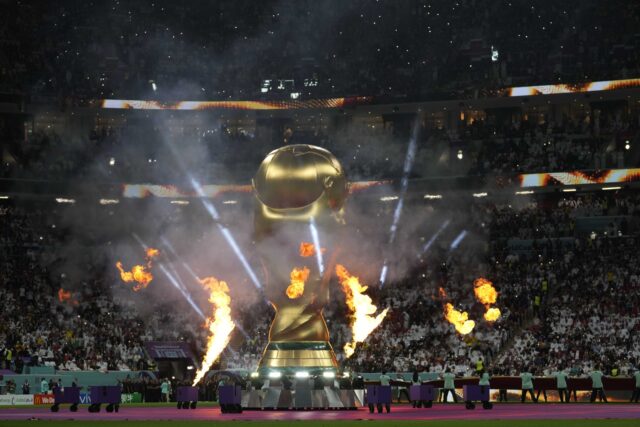The head of Israel’s Military Intelligence on Monday said Iran was considering an attack on the World Cup in Qatar, as it grows desperate in the face of a “civilian rebellion” at home.
Maj. Gen. Aharon Haliva said the anti-regime protests, which were sparked after Mahsa Amini died in police custody after being arrested by the morality police for not wearing her hijab properly, are “extremely exceptional.”
“The death toll, the attacks on national symbols — this is very troubling for the regime, especially combined with sanctions, the existing international pressure, and the difficult economic situation,” he said at an Institute for National Security Studies (INSS) conference in Tel Aviv.
Over 400 people have died over the course of the protests and more than 15,000 arrested.
“There is a real concern within the regime that it endangers the regime. At this stage, I do not see a risk to the regime…. but as the pressure on Iran increases, including internal pressure, the Iranian response is much more aggressive, so we should expect much more aggressive responses in the region and in the world,” Haliva said, according to The Times of Israel.
“I am telling you that the Iranians are now considering attacking the World Cup in Qatar as well,” he said. “The only thing holding them back is how the Qataris will react.”
“Iran is seeking to preserve instability as a constant thing. At a time when the world around it is stable and thriving — this is the opposite of what is happening inside Iran,” Gantz said, speaking at the start of his National Unity party’s weekly faction meeting in the Knesset.
“The World Cup is likely to be one of those events at which it tries to cause instability,” he added.
“Iran is on the whole field, from nuclear to riots,” Haliva said.
According to Haliva, since the beginning of 2022, Iran has carried out around 100 attacks overseas, including cyberattacks and a recent drone attack on an Israeli-owned oil tanker in the Gulf.
“In London, they are preparing for an Iranian attack and they know what they are talking about. The U.S. is preparing for Iranian terror. I am not convinced that the [rest of the] world understands the power that the Iranians bring to the global level,” he said.
“We recognize Iranian fingerprints also in the Palestinian arena,” Haliva said, referring attacks by West Bank terror groups.
“The thought is that it can keep Israel busy at the expense of other things. London, Jenin and Nablus are one and the same in the Iranian vision,” he said.
Addressing Iran’s nuclear aspirations, Haliva warned: “The moment is coming when the greatest test of the international community will come to light, when Iran entertains [the idea of] enrichment at 90%, even if only symbolically.”
“I wonder what the international community will do when Iran starts enrichment at 90 percent,” he said.
Israel Defense Forces Chief of Staff Aviv Kohavi is slated visit the U.S. later this month to discuss the Iranian threat.
If Israel felt the need to attack Tehran’s nuclear facilities, “I would be happy if the US was by our side,” Haliva was quoted as saying in the report.
He went on to claim that Israel’s new Arab allies. which signed normalization agreements under the Trump-led Abraham Accords, may not support a military strike.
“The Abraham Accords intensified [Iran’s] sense of [regional] suffocation. This is a great thing and I hope they would be expanded. But in the end, there is an understanding that we are the regional power, and it is not worth depending on these countries to be by our side on the day of action against the Iranians, because I estimate this will not happen,” he said.

COMMENTS
Please let us know if you're having issues with commenting.